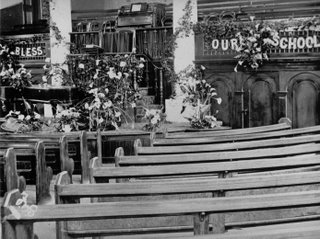 In his essay entitled, “Wheels Within Wheels”, from his book, Cliffs of Opal, Boreham writes to a young man, the son of a ministerial colleague. The young minister had just been ordained and the reader senses a veteran Paul addressing a greenhorn Timothy. Boreham tells our young friend that preaching has "three distinct values." Preaching, he says, should have an entertainment value. This is not to be confused with what comes through our television cable boxes that some call entertainment. Preaching should be of entertainment value in the regard that the preacher should, "at every art of his command...capture and hold the attention of his hearers.
In his essay entitled, “Wheels Within Wheels”, from his book, Cliffs of Opal, Boreham writes to a young man, the son of a ministerial colleague. The young minister had just been ordained and the reader senses a veteran Paul addressing a greenhorn Timothy. Boreham tells our young friend that preaching has "three distinct values." Preaching, he says, should have an entertainment value. This is not to be confused with what comes through our television cable boxes that some call entertainment. Preaching should be of entertainment value in the regard that the preacher should, "at every art of his command...capture and hold the attention of his hearers.It is not enough that [the preacher] should say what it is his duty to say in the first words that happen to come. He must arrange his matter so attractively, and present it so effectively, that the most listless and languid will be compelled to follow him. There is no earthly reason why actors, [lawyers] or statesmen should state their cases more attractively, more convincingly, or, if you like, more entertainingly, than the preacher.
The art of preaching...is the art of compelling the congregation to listen to your message; and you can only be sure that they will listen if you make it worth their while to listen. The Master preachers - Jesus, Paul, Wesley, Whitefield, Spurgeon, Moody and the rest - knew that they had something to say that was well worth saying."
With a rather unique analogy, Boreham continues, "You will never attract or arrest your hearers by an elaborate display of theology. The prominence of theology in a sermon suggests a slipshod preparation. Theology is what ladies call a foundational garment: it imparts shapeliness and affords support to the drapery of your utterance without itself becoming visible. It is very noticeable that Jesus Himself seldom or never became theological." Preaching should have an entertainment value and therefore, force the listener to pay attention.
Boreham also believed that preaching should have an educational value. It "fill[s] the hearts of people, with thoughts and emotions that were startlingly and sensationally new to them."
"And, as an inevitable climax, [preaching] has evangelistic value." In everything the preacher does - from prayer to preparation to delivery - "it [leads] his hearers to the feet of God."
Jeff Cranston
Image: Another photo that FWB took, this one of the inside of the Hobart Baptist Tabernacle on the day of the Sunday School Anniversary. This is a good reminder of Boreham's ability to speak attractively, educationally and evangelistically (GP).


